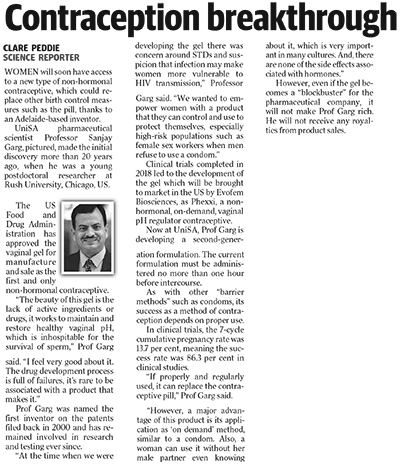World-first contraceptive gel developed by UniSA researcher to hit the US market
By Michèle Nardelli
 HEALTH
HEALTHWomen will soon have access to a world-first non-hormonal contraceptive, which could replace other birth control measures such as the pill, thanks to a UniSA researcher.
 The Advertiser 5 June 2020
The Advertiser 5 June 2020Research into the development of the new contraceptive gel was initiated by UniSA Pharmaceutical Scientist, Professor Sanjay Garg. The vaginal gel has been approved by the US FDA as the first and only non-hormonal contraceptive and will be brought to market in the US this year.
Begun as a post-doctoral research project, the gel has undergone several iterations, culminating in the patents and soon-to-be released contraceptive, made of compounds that restore and maintain the protective vaginal environment.
Prof Garg says the project began with a clear aim to empower women with a gel that would be binding, longer lasting, and protect against conception and sexually transmitted diseases including AIDS.
First patents on the research were filed in 2000 but Professor Garg says continued research and testing, and trials completed in 2018, have led to development of the gel which will be brought to market in the United States by Evofem Biosciences, as Phexxi, a non-hormonal, on-demand, vaginal pH regulator contraceptive.
“The beauty of this gel is the lack of active ingredients or drugs, it works to maintain and restore healthy vaginal pH, which is inhospitable for the survival of sperm,” Prog Garg says.
“We wanted to empower women with a product that they can control and use to protect themselves.”
Unlike many vaginal gels, the new product has been designed to stay put, minimising leakage and maximising its effectiveness for longer. It is also made without some of the harsh additives of other gels which included detergents and often caused irritation or conditions such as vaginitis.
“It is extremely rewarding to see this product get to market, the journey of Phexxi from the bench to FDA approval on May 22, 2020 has confirmed the long incubation period for development of new drugs,” Prof Garg says.
“We hope to achieve the second-generation product that we are currently working on to reach the users much faster.
“My original research aim was to develop a microbiocide that would be a safeguard against STDs and AIDS – something that could be a game changer for high risk populations and that was easy for women to use.”
As with other “barrier methods” such as condoms, its success as a method of contraception depends on proper use.
“If properly and regularly used, it can replace the contraceptive pill,” Prof Garg told The Advertiser.
“However, a major advantage of this product is its application as ‘on demand’ method, similar to a condom. Also, a woman can use it without her male partner even knowing about it, which is very important in many cultures. And, there are none of the side effects associated with hormones.”
Other Stories
- World-first contraceptive gel developed by UniSA researcher to hit the US market
- UniSA wins $7.8m for research to prevent infections, diagnose medical conditions and improve aged care
- SA scientists find breast cancer link in world breakthrough
- Alien frog invasion wreaks havoc on natural habitat
- From the Vice Chancellor
- Achievements and Announcements
- Video: Parenting in a pandemic – how children’s lives will change after COVID-19
- The death of open plan offices? Not quite, but trust and autonomy the new norm in workplaces
- Winter at home is much more enjoyable in a warm house
- UniSA Online offers new 100 per cent online accredited psychology degree
- Workplace flexibility: will it disappear with social distancing?
- Hidden mental health issues among refugees
- Veteran and first responder wellbeing program to expand by offering occupational therapy
- The latest books from UniSA researchers
- In Pictures: UniSA students head back to school




